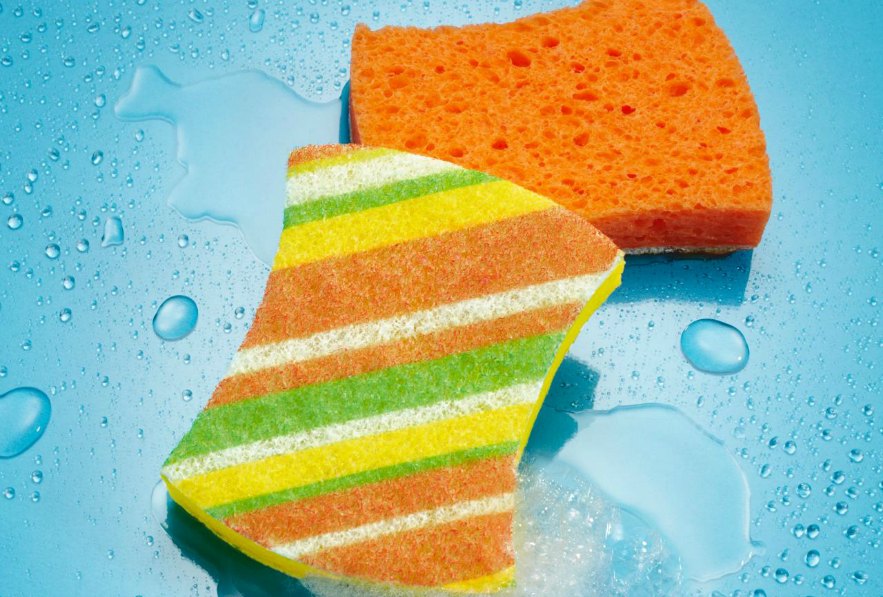As absorbent and convenient as sponges might be, they are also a big attraction for the nasty little fellas we call germs and it seems to be a mutual thing. Germs love to get lost within the sponge, as much as sponges love to keep them and give us hard time having them all neat and clean again. This calls for the development of special skills and attention, such a the following tips and pieces of advice:
Clean the Sponge Daily
No day should go by without at least one single battle against those cross-contamination causers. You can choose to use hot water and soap and soak the sponge in the mixture for several minutes, or opt for a more effective method by heating the sponge in a microwave. This is how you can eliminate most of the germs and the very harmful pathogens from food leftovers.
Often Replace Your Sponge For Cleaning
It is true that by cleaning your sponge daily you can reduce the amount of bacteria that reside on it, but without frequent replacement you'll be risking your health by exposing yourself to lots of dangerous pathogens. Smelly sponges should not be cleaned at all, but tossed right away.
Keep It In a Dry Place
Germs love wet areas, so when you leave your sponge on the wet counter-top, it's like a party for them! Choose a dry place where you'll leave your sponge after washing/cleaning and you will significantly prolong the durability of the sponge for cleaning and it won't get sticky that soon. However, make sure that you don't leave it in an enclosed area either, the air is very much welcomed to dry it and prevent the multiplication of bacteria.
Never Use a Sponge to Wipe Meat Juices
One very important thing to note is never to use a sponge to wipe spills from meat juices unless you plan to throw it right away. There simply isn't a way to guarantee that pathogen bacteria won't go wild after you do this risky and completely unhygienic move, so you better never do it.
Don't Rely on Sponges for Cleaning Countertops
As we already mentioned, sponges for cleaning are a major attraction for germs and they shouldn't be used to clean something that needs daily maintenance such as a counter-top. For that purpose, you should use a paper towel that can be thrown right away along with all the harmful germs.
No day should go by without at least one single battle against those cross-contamination causers. You can choose to use hot water and soap and soak the sponge in the mixture for several minutes, or opt for a more effective method by heating the sponge in a microwave. This is how you can eliminate most of the germs and the very harmful pathogens from food leftovers.
Often Replace Your Sponge For Cleaning
It is true that by cleaning your sponge daily you can reduce the amount of bacteria that reside on it, but without frequent replacement you'll be risking your health by exposing yourself to lots of dangerous pathogens. Smelly sponges should not be cleaned at all, but tossed right away.
Keep It In a Dry Place
Germs love wet areas, so when you leave your sponge on the wet counter-top, it's like a party for them! Choose a dry place where you'll leave your sponge after washing/cleaning and you will significantly prolong the durability of the sponge for cleaning and it won't get sticky that soon. However, make sure that you don't leave it in an enclosed area either, the air is very much welcomed to dry it and prevent the multiplication of bacteria.
Never Use a Sponge to Wipe Meat Juices
One very important thing to note is never to use a sponge to wipe spills from meat juices unless you plan to throw it right away. There simply isn't a way to guarantee that pathogen bacteria won't go wild after you do this risky and completely unhygienic move, so you better never do it.
Don't Rely on Sponges for Cleaning Countertops
As we already mentioned, sponges for cleaning are a major attraction for germs and they shouldn't be used to clean something that needs daily maintenance such as a counter-top. For that purpose, you should use a paper towel that can be thrown right away along with all the harmful germs.

